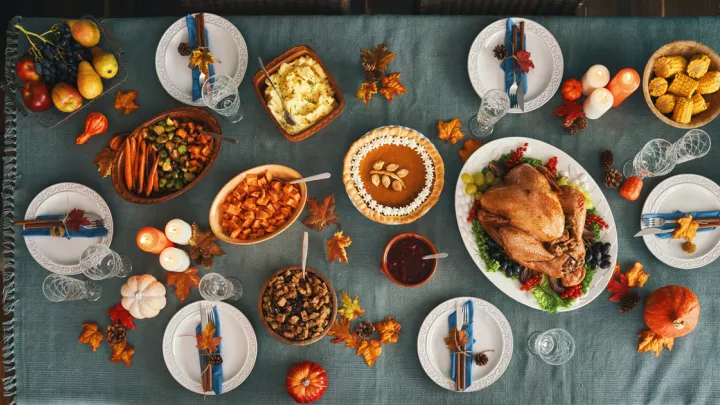10 tips to avoid overindulging during the holidays

By registered dietitian Sarah Keegan, RDN, LMNT, CDCES
The holidays are a time of celebration and tend to include a lot of eating and drinking. So, how can you enjoy the festivities without overindulging? As a dietitian, I believe it’s all about balance. In fact, you can still enjoy lots of wonderful holiday treats without regret.
Here are 10 tips to help you enjoy holiday celebrations without overindulging.
- Don’t skip meals – Remember to eat three meals a day, even if it is a smaller snack instead of a meal. Breakfast is especially important, as research shows those who eat breakfast tend to eat fewer calories throughout the day. Holiday celebrations can be busy, chaotic and overscheduled, so even if it’s a smaller meal, include a protein source such as Greek yogurt, cottage cheese or nuts, and a small piece of fruit or slice of whole grain bread or whole grain crackers for balance.
- Choose wisely – Survey party buffets before filling your plate, or wait until all the food is on the table before making your selections. Then, pick the items you think you will most enjoy and skip the ones you might not like as much. This can help portion control and avoid overeating.
- Listen to your body – Eat until you’re full, not stuffed. Think of a scale from 1 to 10, with 1 being starving, 10 being stuffed, and somewhere around 7 being fully satisfied. Check in with yourself while eating to evaluate your rating. Try to wait 10-20 minutes before going back for seconds to help determine if you are truly still hungry. This is especially important if your medication regimen includes glucose-like peptide-1 receptor agonists.
- Eat slowly – Another trick is to savor the foods you indulge in by simply eating them slowly. This may leave you feeling more satisfied and less likely to overindulge.
- Minimize distractions – Studies show people who eat while distracted are more likely to overeat. This is because you’re less aware of your body’s fullness signals. To prevent this, eat mindfully and minimize distractions like TV, phones or eating while playing games with family or friends. Take a break from the entertainment to enjoy a snack.
- Limit liquid calories – Alcohol, soda and other calorie-rich beverages are prevalent during the holidays. These drinks contribute a significant amount of sugar and empty calories to your diet without filling you up, which can cause weight gain.
- Take the focus off food – Consider planning holiday events that don’t revolve around food. Some options include sledding, ice skating, bowling, making gingerbread houses, playing games, watching holiday movies, and driving or walking around to see the lights.
- Get adequate sleep – Sleep deprivation is quite common during the holidays, and studies show it contributes to excess weight gain. This is because those who do not sleep enough tend to be hungrier, consume more calories and exercise less. To maintain your metabolism and natural circadian rhythm, make sure you’re getting at least seven hours of sleep at night.
- Manage your stress levels – The holidays can be stressful. Stress raises cortisol, which can increase your food intake and cause weight gain. Keep stress levels low by prioritizing self-care. Some options include exercising, meditating and deep breathing.
- Move your body – Exercising for as little as 10 minutes a day can help you regulate your blood sugar, boost your metabolism and avoid overeating. Do a quick circuit, walk the stairs, have a living room dance party or scoop snow – anything to get your blood pumping!
Make your weight loss resolution a reality this year
Read more about our nonsurgical and surgical weight loss programs or call 402.559.9500 to get started.
Read more about our nonsurgical and surgical weight loss programs or call 402.559.9500 to get started.








